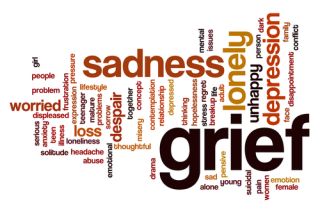Grief
Making Meaning From Grief and Loss
Grief does not just happen after the death of a loved one.
Posted December 19, 2022 Reviewed by Gary Drevitch
Key points
- Grief can occur from a vast array of life's challenges and there is no set time for how long it should last.
- Grief disproportionately affects Black Americans (BIPOC).
- Grieving can have an impact on your eating disorder.

Whether it’s in response to the death of a loved one, losing one’s job, or something more ambiguous, grief is a normal human response to loss. Although it’s one of the most universal experiences, grief can look vastly different from person to person. There isn’t one predetermined course one can expect grief to take, with normal grief spanning different amounts of time and encompassing a variety of emotions. Grief can occur for a multitude of reasons, from the death of a family member to the loss of a relationship, even to the loss of opportunities or abilities. The recent COVID-19 pandemic has left many families grieving the death of a loved one and facing holiday anniversaries without a family member. As well there was an increase in overdose deaths during the pandemic that reached over 100,000 deaths.
Grief does not just happen after the death of a loved one.
Overall, grief isn’t a state; it’s a process, and not one that can be charted beforehand. When we think of grieving, we tend to imagine a scenario where a loved one has died: In fact, researchers have documented a common ‘process’ following a death, including a period of numbness followed by depression, then reorganization and, ultimately, recovery. While this is certainly a scenario in which one might grieve, it is only the tip of the iceberg; grief can occur in response to a vast array of life’s challenges.
One topic often left out of the conversation that is often a source of grief is aging. The loss of youth, opportunities, and abilities, as well as the sense that time is of the essence, can trigger a grieving process similar to that described above. Even though this is a common occurrence, grief in this context still impacts each person differently; regrets may surface as time moves on, and shame may rear its head as one reckons with all the things they could have done but didn’t.
This is often seen, particularly, regarding physical health. Many may find that it becomes difficult as one ages to stay healthy, especially in the wake of new health issues that come up or old health issues that come to a head. For example, one may experience grief as arthritis takes away their ability to exercise, an action they previously relied on to maintain their health.
There is no right way to grieve.
Grief may be a universal experience, but there certainly is no ‘right way’ to grieve. Studies show that how long you grieve, and how intensely, has a lot to do with your personality, attachment style, genetic makeup and unique vulnerabilities; age and health; spirituality and cultural identity; supports and resources; the number of losses; the nature of the relationship (e.g., interdependent vs. distant, loving vs. ambivalent); the relation (parent vs. child vs. spouse vs. sibling vs. friend, etc.); and the type of loss (sudden and unanticipated vs. gradual and anticipated, or natural causes vs. suicide, accident or homicide).
Complicated grief, sometimes referred to as unresolved or traumatic grief, is the current designation for a syndrome of prolonged and intense grief that is associated with substantial impairment in work, health, and social functioning. Ambiguous grief is a term used to describe grief in response to a loss that isn’t recognized by society, such as the loss of a child to addiction, or the loss of an estranged romantic partner.
Grief disproportionately impacts BIPOC.
Historically, grief has disproportionately impacted BIPOC for many reasons. Black Americans die at higher rates than white Americans, for reasons including but not limited to poverty, limited healthcare, and criminal victimization. Additionally, Black Americans are three times more likely to lose their mothers than white Americans, 2 times more likely to lose their fathers, 20% more likely to have lost a sibling, and 2.5 times more likely to have lost a child by age 20. COVID-19 only amplified this disparity. With these differences in mind, we can see that Black Americans likely lose more loved ones throughout their lives, creating more potential periods of grief.
How do we create meaning following a loss?
One of the most cited models for grieving process are the five stages introduced by Elizabeth Kubler-Ross: denial, anger, bargaining, depression, and acceptance—although they do not apply to many frievers and in any event, rarely follow a set order. David Kessler has suggested a sixth: finding meaning, which he defines as "a way to sustain your love for the person you have lost." Through finding meaning, grief is transformed into a “peaceful and hopeful experience.” So, what does this look like? Finding meaning can be as simple as moving from remembering a loved one painfully to remembering with love, being able to find meaning and peace in memories instead of pain or passing on the love of a deceased loved one through supporting others, volunteering, or writing about one’s life and story, and finding ways to keep the loved one’s legacy alive.
Some people continue a relationship with the deceased through living legacies, such as carrying out the deceased’s mission, memorial donations, or seeing them live on in others through genetic endowments. For others, periodically visiting the grave or lighting candles may help keep memories alive. While the relationship has changed, you can take comfort in knowing that the relationship does not have to be completely severed; instead, it is perfectly normal for the relationship to endure forever.


